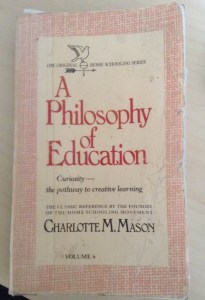 I started this post a good while ago, because now I’m actually nearing the end of this read- through of A Philosophy of Education. But I decided to go ahead and post it anyway. I continue to be amazed at how much I learn from each successive reading of Charlotte Mason’s volumes.
I started this post a good while ago, because now I’m actually nearing the end of this read- through of A Philosophy of Education. But I decided to go ahead and post it anyway. I continue to be amazed at how much I learn from each successive reading of Charlotte Mason’s volumes.
I’m diving into a fresh read of A Philosophy of Education, Charlotte Mason’s sixth and final book. This is the book she wrote at her most experienced season of life—her final years. It takes into consideration what she observed during The Great War (WWI), and the dramatic changes and unrest in British society. That whole social justice thing? You wouldn’t believe how similar it is to questions they were facing in that time and place, with “class” rather than “race” being the dividing factor.
Speaking into that culture at that time, about the subject that was near to her heart—education—Charlotte Mason hopes the British public will take a look at the work and results that she and her colleagues had achieved, and take it up in a wider field.
As I read through just the first few pages of chapter 1, I was struck afresh with the clarity and directness of her message. She doesn’t miss a trick.
Charlotte Mason says that she has
labored for fifty years to find the answer, and am anxious to impart what I think I know.
How about that for a demonstration of genuine humility? She doesn’t give herself the label of “expert” or “guru” or “leading authority,” in spite of her fifty years of labor in her field. She says she has labored to “find the answer,” and there is so much implied by that phrase. It means she was seeking—asking questions—and even at this stage of her journey, she does not impose her ideas on others.
Rather than laying down the law, she extends an invitation (which I borrowed as the title to my first book) to her readers then and to her readers now:
But the answer cannot be given in the form of ‘Do’ this and that, but rather as an invitation to ‘Consider’ this and that.
What a relief to the harried homeschool (or classroom!) teacher. There is not a list of absolutely vital boxes that must be checked off, each and every one, in order to understand and implement a ‘Charlotte Mason’ education. She has given us principles to consider, and when we have thought about the principles, their applications, and the specific suggestions that illustrate them, we’ll be ready to act with confidence.
Action follows when we have thought duly.
That’s one tiny paragraph, but it packs a powerful message. I hope you won’t fall into the trap of thinking that a Charlotte Mason education can be accomplished by the completion of a myriad of specific tasks—“do this” and “do that.” Rather, your educational efforts will draw nearer to her ideal and shape themselves into life-giving practices, as you thoughtfully consider each principle, both for itself and in relation to the whole.
Start with “Children are born persons” and “Education is the science of relations.” If you keep those two principles in the forefront of your thoughts, you’ve got a great beginning and a solid foundation for understanding the rest.
I guess I’ll go finish this volume now. I already know which one I’m going to pick up to read next.
Thank you so much for the wise words, Karen! I tend to over analyze things at times—trying to make sure that I try to do things “the right way” as most likely most homeschool moms do. Great reminder not to get tied up in the practices and focus on the principles.